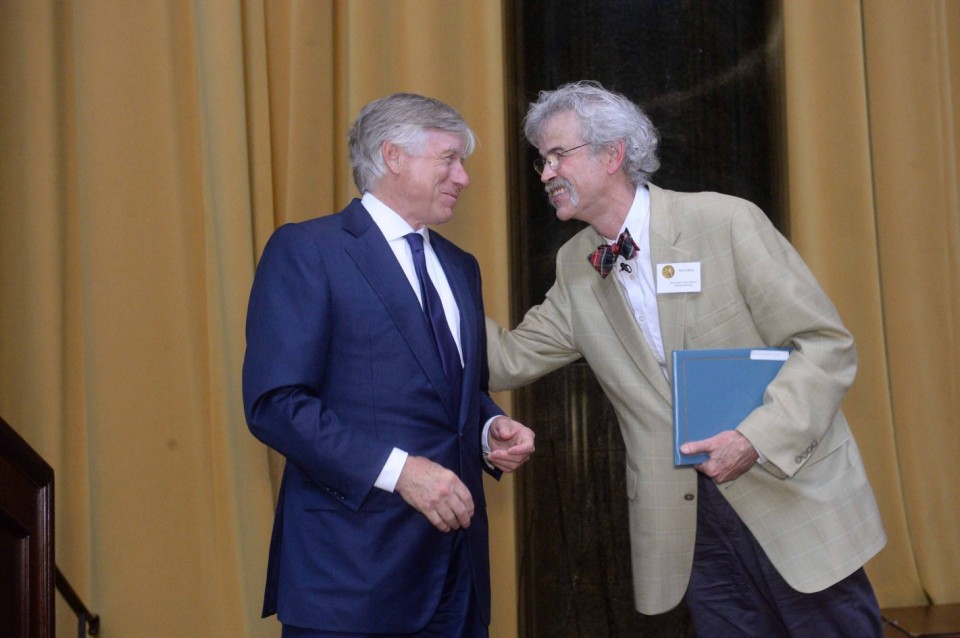York News Times: Seeds

Art Cullen of The Storm Lake (IA) Times accepts the 2017 Pulitzer Prize for Editorial Writing from Columbia University President Lee C. Bollinger.
Art Cullen, water, denial and the Pulitzer Prize
Art Cullen, Pulitzer Prize winning editorialist and co-owner of The Storm Lake Times isn’t caught up in awards or accolades. What he does want us to all understand is the water situation in Iowa, and across the country, that is serious and impacts all citizens – urban and rural.
I went to visit Cullen at the newspaper he co-owns with his older brother John. Art is editor and John is publisher. The paper hearkens memories of the television show, Lou Grant, an open room with the smell of ink and cigarettes settling on the stacks of research everywhere, especially Cullen’s desk. About the award, he said, “I was surprised. We weren’t sure anyone was listening to us out here. I would argue that no one is really listening today.” That’s why Cullen wants to take every opportunity to talk water, rural despair and climate change – the issues he has been writing about for most of his life.
In his March 3, 2016 editorial (one of 10 that earned him the Pulitzer) entitled: “BV (Buena Vista) is losing the public” Cullen wrote, “The public would appear to have made up its mind about the Des Moines Water Works lawsuit against Buena Vista, Calhoun and Sac Counties over nitrate pollution of the Raccoon River. The Des Moines Register’s Iowa Poll reported Sunday that 60 percent of those surveyed believe the water works was right to sue drainage districts in the three counties for discharging polluted water into the river. . . . Urban residents, small towners and even rural dwellers all show majority support for the water works position. This, after a barrage of advertising in the Des Moines TV market sponsored by Farm Bureau, and a host of radio ads aiming to fire up rural residents against encroaching government . . .”.
A federal judge has since dismissed the Des Moines Water Works lawsuit against drainage districts in Sac, Buena Vista and Calhoun Iowa counties that the utility said are leading to high levels of nitrates into the Raccoon River. That dismissal means that the water quality issues are for the people of Iowa and the Iowa legislature to resolve. However, Cullen said, you can’t resolve what you’re in denial about – even with big money and politics. He said when it comes to the agriculture, industrial and some residential collective impact on the environment and the overall reality of climate change on his area of Iowa and across the nation, “Denial is a powerful thing. We’re all in denial.”
Cullen said many farmers are ignoring or don’t know what some of their practices are leading to, “We are sending Iowa’s best land down the Mississippi and overflowing the surface water with nitrates and phosphorous. . . . Our best land is now in the Gulf of Mexico in an area the size of New Jersey.”
He said there is ample room for farmers and ranchers to do the right thing, “There are about 40,000 commercial farms in Iowa doing more than $100,000 in income. The corn is planted right up to the Raccoon River. There are only around 2,600 of these farmers using state water quality programs. Do you think the rest of them care?”
Along with the nitrates heading down the Mississippi is an exodus of Iowa’s future leaving the state. Cullen pointed out, “Two-thirds of Iowa’s population has been lost since 1920. The schools are closing down and buildings are imploding. The Department of Natural Resources has a government program to take down rural buildings. . . . Now we have ethanol plants surrounding us. One-third of Iowa’s corn crop goes to ethanol, another third is consumed by hogs in confinement. It is a tightly woven ag-supply chain. You unravel one thread and you unravel the entire supply chain. Monsanto and Dow DuPont cannot afford that to unravel.”
In the end, he said, “Nature will still force us to do what nature is going to do. . . . Nature will dictate how we react to the landscape no matter what we think of the WOTUS (Waters of the United States) rule or the Des Moines Water Works lawsuit. . . . It’s a battle for hearts and minds.”
Cullen is gaining national and international attention regarding the realities he is writing about. Are we listening? We should be. The good news is we can do something about these serious issues – but not if we’re treading water on the river of denial.
Read more about Art Cullen and find the collection of writings that earned him the Pulitzer Prize at: http://www.pulitzer.org/winners/art-cullen.